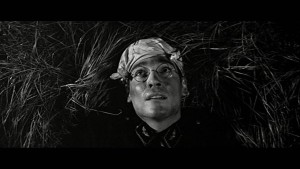Europa
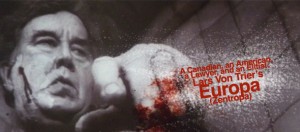 Here’s the idea behind “A Canadian, an American, a Lawyer, and an Elitist”: Rhett’s favorite movie is “Meatballs 4”, Shawn has an unhealthy fixation on Resident Evil, Richard scoffs at anything that isn’t pretentious and hoity toity, and Adam is a prick who hates everything. We all watch far too many movies, and spend our time analyzing them. So we each watch the same movie, write our analysis of them, and then go to a chat room to discuss it, unaware of what the others have written. A warning: if you haven’t seen the film we are discussing, it may not be best to read this article, because it is spoiler heavy.
Here’s the idea behind “A Canadian, an American, a Lawyer, and an Elitist”: Rhett’s favorite movie is “Meatballs 4”, Shawn has an unhealthy fixation on Resident Evil, Richard scoffs at anything that isn’t pretentious and hoity toity, and Adam is a prick who hates everything. We all watch far too many movies, and spend our time analyzing them. So we each watch the same movie, write our analysis of them, and then go to a chat room to discuss it, unaware of what the others have written. A warning: if you haven’t seen the film we are discussing, it may not be best to read this article, because it is spoiler heavy.
Keep in mind that these articles were written in 2005, long before Criterion put out a stacked 2 disc set of Europa.
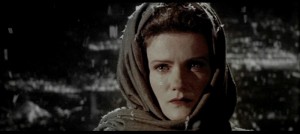 Analysis by a Canadian: Rhett Miller
Analysis by a Canadian: Rhett Miller
Europa is at times beautiful, at times hypnotic, at times profound, but always pretentious. Filmed by the Danish auteur and Cannes darling, Lars Von Trier, the film has an experimental beauty. The visuals are a collage of black and white, color, blue screens, dutch tilts, wild camera movements, and everything else that would signal a wildly imaginative eye. The problem is, the meanings behind the images are so opaque that the visuals move from beautiful to downright distracting. Why all of a sudden does a scene change from black and white to color? Sometimes it changes when two people first find love, other times it changes when a boy drops an assassination bullet. I am sure there is some connecting theme that unites these images, but that is a thread probably only Von Trier can explain. More than likely, Von Trier fooled with the color scheme because, well, he could.
Some of the experimental imagery lends well to the story. The drowning frenzy of the finale is overpowering and suffocating. The red droplets of blood drawn from a suicidal shaving also resonate with extreme power. These have a noticeable purpose, to evoke feelings of worry, as in the former, and sadness, as in the latter. But more often than not, the images conveyed in the film are manipulated in a way that is isolating to the audience. Steven Spielberg, who is a fan of the film, employed similar visual effects to his take on the holocaust, Schindler’s List. He shot it entirely in black and white, but the scenes that resonate most are those with the little girl digitally colored in red. In those scenes the color evokes so much emotion, it is manipulative, but focused. In Europa however, the visuals never really amount to all that much other than being pretty. It is often unclear what these hyper-realistic images are supposed to convey, and that often takes away from the narrative.
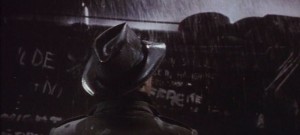 Not that there is a whole lot of understandable narrative to begin with. The movie is frustrating, alienating. It begins and ends with the hypnotic voice of Max von Sydow, who entrenches us into the world of Europa. We get a great sense of what the visual look of it is, but what about the story? Something about an American naive who voluntarily tries to help the Germans, falls in love, and is ultimately taken advantage of as the film flows back into its hypnotic narration. I imagine it is a meditation on how little foreigners know of the lands they attempt to aid, which is as important now with Iraq as it was during the 1945 Germany depicted in the film. Its ironic that Von Trier sets an American unaware of his surroundings as the main character, considering he himself has never been to America. That is part of the problem with the film, as it appears that Von Trier doesn’t really know his main character at all.
Not that there is a whole lot of understandable narrative to begin with. The movie is frustrating, alienating. It begins and ends with the hypnotic voice of Max von Sydow, who entrenches us into the world of Europa. We get a great sense of what the visual look of it is, but what about the story? Something about an American naive who voluntarily tries to help the Germans, falls in love, and is ultimately taken advantage of as the film flows back into its hypnotic narration. I imagine it is a meditation on how little foreigners know of the lands they attempt to aid, which is as important now with Iraq as it was during the 1945 Germany depicted in the film. Its ironic that Von Trier sets an American unaware of his surroundings as the main character, considering he himself has never been to America. That is part of the problem with the film, as it appears that Von Trier doesn’t really know his main character at all.
Jean-Marc Barr, who plays the American in the film, often has little to do. His character is a transparency. People talk at him, through him, but he never has any concrete development. It is as if Von Trier did not, could not, understand an American character, so instead he developed everyone else hoping nobody would notice what a frail waif of a character Leopold Kessler is. Not surprisingly, Barr does a dreadful job of trying to give life to the Kessler’s inane dialogue. He says each line as if he were performing in a school play, without intonation or true emotion. The end is particularly laughable, when one moment he is yelling “fucking Auschwitz!” and the next he is entirely introverted, asking for silence. Never has a lead been more lifeless and amateur. Had Jeremy London not been available for Mallrats, Kevin Smith would have chosen Jean-Marc Barr.
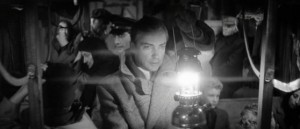 The acting is, not surprisingly, better with all the European characters, given that they are closer to Von Trier own experiences. Barbara Sukowa is solid in her limited role as Barr’s love interest. She remains quietly seductive throughout, but it isn’t until the end that she really shines. In her monologue to Barr on the werewolf (both the beast and the violent organization) she reveals with force the true motivation behind her actions. The monologue, both brilliantly acted and written, is the film’s best moment. It expresses what Von Trier’s unkempt imagery could not: it tells of the essence of war, and how man struggles to retain his humanity even when violence tries to bring out the beast. It is a monologue that works on many levels, which is more than can be said for Von Trier’s distancing visuals.
The acting is, not surprisingly, better with all the European characters, given that they are closer to Von Trier own experiences. Barbara Sukowa is solid in her limited role as Barr’s love interest. She remains quietly seductive throughout, but it isn’t until the end that she really shines. In her monologue to Barr on the werewolf (both the beast and the violent organization) she reveals with force the true motivation behind her actions. The monologue, both brilliantly acted and written, is the film’s best moment. It expresses what Von Trier’s unkempt imagery could not: it tells of the essence of war, and how man struggles to retain his humanity even when violence tries to bring out the beast. It is a monologue that works on many levels, which is more than can be said for Von Trier’s distancing visuals.
When all is said and done, and Max von Sydow’s hypnotic narration subsides, what is left is a beautiful film made by and for Lars Von Trier. Trier, being the paranoid agoraphobic that he is, has made a film that is always at a distance. He is afraid of people, using projected images and the lens of the camera to distance himself from his subject matter. Nothing is ever involving, and even if that is the point, it still makes for empty viewing. Europa is like a collection of “wish you were there!” postcards sent by your best friend while you are stuck at home. The images look great, but without any context of experience, they are empty and even frustrating. You want to be there, you want to experience something, but this is a trip that Von Trier takes alone.
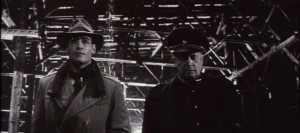 Analysis by an American: Shawn
Analysis by an American: Shawn
Europa is a difficult film to diagnose, and there is a problem with it. It just is not very easy to pin-point. The film is full of fantastic imagery that reinforces the dreamlike tone that director Lars Von Trier was going for. You get the requisite repeating image of train tracks, and constant use of rear projections, and other exaggerations. The projections make up the bulk of the film and I was so in awe of them that I had to re-watch several scenes because I got so lost in the wonderful ways in which they were used. As I watched the film, my mind started to drift towards other films made during the period Europa takes place in. I recalled how many films used projections because a lack of better technology available. Noir films in particular used these techniques and while obviously dated, it was very interesting to see how Von Trier used these obvious influences here to “date” his own film; made to almost resemble a film made in the late 40s or 1950s. In addition, since it is undeniable to say those scenes looked realistic, it adds to the dream state that we are supposed to feel. That is simply, wonderful craftsmanship. There was other several other sequences that were beautifully shot. My particular favourite would probably be the sequence with the child with the gun on the train. The quick cuts, with the exaggerated projections to play with depth, and the switching back and forth with B&W and four-colour pulp novel shades, make it one of the most engaging scenes in the film. A close second would be Max Hartmann’s (Jorgen Reenberg) suicide scene. The pan into overhead shot, split by the door as blood fills the bathroom and slowly starts to leak out under the door. It’s easily one of the film’s most memorable scenes.
There is really no complaint that can be said about the quality of acting either. I never once rolled my eyes; although a viewer could easily be forgiven for doing so if they aren’t familiar with the common conventions of Noir films. Barbara Sukowa makes a fine addition to a long line of femme fatales. She is no Veronica Lake, but she does pull off the double-cross on the protagonist with panache true to the genre’s roots. The always enjoyable Udo Kier is present here, but he does not get near enough screen time. That saddened me, as I always find his presence just a wonder. In Europa, the scene that highlights his wonderful look is when he stares coldly straight forward as he wades through the carriage cars of what echoes concentration camp victims.
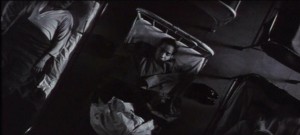 I could sing the praises of the look of this film for hours, but really, there is not much more then that which I liked in Europa. Von Trier seems to have forgotten, in the midst of his brilliant visual ideas to make a strong narrative. Sure, Max von Sydow’s narration is enjoyable, and adds to the dream state. But by mid-film, I felt it was a crashing bore and an “easy out” to get to the next sequence. It was certainly a creative way to simulate hypnosis at the beginning of the film, but Europa has the cast to carry itself from there. I don’t need to be told I am making love when this is obvious from what I am seeing. Stringing it out through the course of the film was simply overkill. I did like that the pacifist becomes the most militant character in the post-war situation. I enjoyed the irony in that, but I feel that the movie was too arty for its own good. As I stated earlier there is a lot of story easily missed if you allow yourself be enamored by the visuals alone. It certainly is a deep film but it warrants several viewings. Alas, as of writing this, I only gave it one.
I could sing the praises of the look of this film for hours, but really, there is not much more then that which I liked in Europa. Von Trier seems to have forgotten, in the midst of his brilliant visual ideas to make a strong narrative. Sure, Max von Sydow’s narration is enjoyable, and adds to the dream state. But by mid-film, I felt it was a crashing bore and an “easy out” to get to the next sequence. It was certainly a creative way to simulate hypnosis at the beginning of the film, but Europa has the cast to carry itself from there. I don’t need to be told I am making love when this is obvious from what I am seeing. Stringing it out through the course of the film was simply overkill. I did like that the pacifist becomes the most militant character in the post-war situation. I enjoyed the irony in that, but I feel that the movie was too arty for its own good. As I stated earlier there is a lot of story easily missed if you allow yourself be enamored by the visuals alone. It certainly is a deep film but it warrants several viewings. Alas, as of writing this, I only gave it one.
This is my first viewing of any of Lars Von Trier’s films. Therefore, I can’t really go into detail about themes that run through his works that may, or may not, be played upon here. I understand that this is the third in a trilogy of films set in post-WWII Germany, and based on my own personal interest in that era; I will definitely give the others a look. Based on this movie alone though I think Europa is all scenes, and little movie.
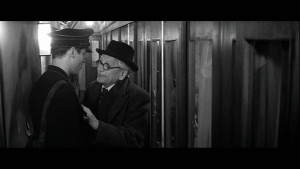 Analysis by a lawyer: Richard Stracke
Analysis by a lawyer: Richard Stracke
Europa is Lars Von Trier’s most enjoyable film. In terms of visceral impact, it falls below Breaking the Waves and Dancer in the Dark, but those films are too draining to be viewed regularly. Despite its unconventional nature it is also more cohesive and ultimately more rewarding than the rest of his European trilogy. My memories are hazy, but The Element of Crime seemed more concerned with its sepia tones than with its characters. Epidemic had its transcendent moments- mainly images from the protagonists’ attempted film, but it was weighted down by exasperatingly tedious struggling screen writer sequences. Europa seems to have been made at precisely the right time. Von Trier was self assured, but he hadn’t discarded heightened stylization for the Dogme95 aesthetic.
Set in post-war Germany, Europa is more than a portrait of broken country’s first steps toward recovery. It is a tribute to Rainer Werner Fassbinder and silent expressionists. I was immediately taken by Katharina Hartmann. After all, she is played by Barbara Sukowa- star of Lola and pivotal player in the fifteen hour Berlin Alexanderplatz. Those films (along with many of Rainer’s other features) focus on 20th century Germany’s two great collapses. Her character blends elements of both Fassbinder roles- naive victim and social climber. I’m sure that many viewers will appreciate the film on its own merits, but having a knowledge of Sukowa’s battered past added another to my experience. She is also a classic nor femme fatale- alluring, mysterious, and intimately connected with everything that led to her nation’s demise.
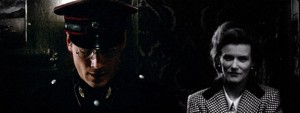 I was fascinated by the film’s world and the use of narration. The idea of ‘it was all just a dream’ is a tired one and I hoped that Von Trier wouldn’t discredit 90% of the film by ending with a shot of a sweaty semi-conscious man huddled in a dark bedroom. When the ending finally arrived and we weren’t allowed to wake up, I was both relieved and mortified. No, Von Trier didn’t cop out, but his ending is just as bleak as the tragedies of his later films. The emotional weight of Watson/Bjork/Kidman’s plights may be harder to bear, but given some distance, it is easier to accept their fates than the idea that Von Trier’s bleak Germany (as allegorical as it may be) is in fact, reality.
I was fascinated by the film’s world and the use of narration. The idea of ‘it was all just a dream’ is a tired one and I hoped that Von Trier wouldn’t discredit 90% of the film by ending with a shot of a sweaty semi-conscious man huddled in a dark bedroom. When the ending finally arrived and we weren’t allowed to wake up, I was both relieved and mortified. No, Von Trier didn’t cop out, but his ending is just as bleak as the tragedies of his later films. The emotional weight of Watson/Bjork/Kidman’s plights may be harder to bear, but given some distance, it is easier to accept their fates than the idea that Von Trier’s bleak Germany (as allegorical as it may be) is in fact, reality.
Initially, I struggled with the lead character. Kessler bumbles about and is not exactly dramatically gripping. After I settled in, I realized that was what the film needed. As the stand in for the viewer, he is as uncomfortable as we would be in similar circumstances. He also brings the film’s darkly comic side to the forefront- interactions with petty bureaucrats, the horrors of public service professions. Although serious issues are tackled, Von Trier’s use of a surreal visuals and near caricatures in supporting roles keep the film from being as traumatic as his later work. Casting himself as the unscrupulous Jew was another amusing touch.
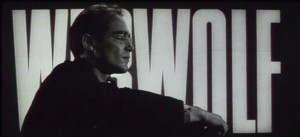 Although I enjoyed many scenes, the highlight was the crosscutting between Sukowa’s seduction of Kessler and the elder Hartmann’s suicide. I’m a sucker for ironic juxtaposition and Von Trier pulled it off brilliantly. The fact that the character’s libidinous desires derailed the toy train did more than foreshadow the watery ending. It was a bleak reminder of the film’s layered structure and the callous nature of humanity. The use of color is also notable. Splashes of color appear throughout the film, but rarely are they used so effectively.
Although I enjoyed many scenes, the highlight was the crosscutting between Sukowa’s seduction of Kessler and the elder Hartmann’s suicide. I’m a sucker for ironic juxtaposition and Von Trier pulled it off brilliantly. The fact that the character’s libidinous desires derailed the toy train did more than foreshadow the watery ending. It was a bleak reminder of the film’s layered structure and the callous nature of humanity. The use of color is also notable. Splashes of color appear throughout the film, but rarely are they used so effectively.
Say what you will about the inconsistencies and frequent confusion. The plot may be as convoluted as a Chandler detective story (The Big Sleep is a prime example). The leading man may be ill prepared to show Germany the kindness that it deserves. The techniques employed may be too avant-garde for a general audience. This is a rare film; one that creates an atmosphere all its own; one that stands on the strength of its visuals. In an age of mediocrity, I’ll gladly take my chances with anything that may be captivating. I may be disappointed nine out of ten times, but to my delight, this wasn’t one of those occasions.
Whether Lars Von Trier intended Europa to be an indictment of America because of their inactivity in WWII until it was too late for Europe, or he wanted an excuse to mix disingenuous melodrama with over the top technique, as in his later work like Dancer in the Dark and Dogville, would be difficult to gauge, since he never fully commits in either direction. Certainly the Leopold Kessler character, who is constantly acted upon by outside forces during the film, has no control over any situation, which points to America’s focus on being the world’s policeman since they were attacked at Pearl Harbor. And Kessler’s frustration builds to an outburst at an inappropriate moment with a gun (dropping the bomb on Japan), when he probably should have said something much earlier (defending the world from Hitler when it was clear assistance was required) and made clear where he stood.
The criticism of passivity (“God doesn’t forgive those who are lukewarm”), is a little confusing since Von Trier likes to punish those who follow their hearts for the act of being genuine, as he showed in Breaking the Waves and Dancer in the Dark (Bess and Selma try their best and are punished for it by selfish people in their lives). Max Hartmann’s character says to Leo Kessler, “Always do what you think is right,” directly before slitting his wrists out of guilt for lying on his questionnaire. And from the way that Leo is treated throughout, one person after another, from all sides, forcing their will on him, you would think that was Von Trier’s point. But that is refuted by the fact that Von Trier himself plays the Jew who comes to verify that Hartmann is genuine, and had nothing to do with the Nazis. In this scene, Von Trier is literally representing himself, in control of the scene for Hartmann’s sake, and in control because he is the writer/director, but all he does is sell out to the Americans because he was caught stealing some food. The fact that we are shown him spitting on the doorstep as he is leaving out of disgust, is an afterthought.
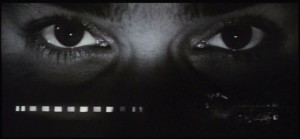 Kessler’s inert behavior causes the viewer to lose interest in the dramatic flourishes that Von Trier continuously attempts. The hands reaching for each other between the trains, the blood filling the bathroom, the heightened music, all undermined, as it is nearly impossible to relate to Kessler. We are constantly shown that the whole movie is a confining dream, moving from one frustrating event to another, even the drowning, as realistic and hypnotic as it is, has no real bearing on how the viewer feels. This is because of Kessler’s general ignorance and foolishness as a person. He doesn’t even have the self-awareness to realize that the train he is conducting was previously used to cart Jews to execution, and his naive thought that he could somehow help the German people because they needed someone to side with them, is laughable and condescending. It would be like a lone American, traveling to Iraq now, ignoring any political events and assuming his presence should be cherished. So as Kessler’s life crumbles around him, the marriage, the way his uncle pushes him around, the fact that both the Werewolves and the Americans are using him for unknown purposes, one has a difficult time empathizing with him. That may be part of Von Trier’s idea, exploiting Kessler’s idiocy as a representation of foolish American jingoistic behavior, believing that their brains, kind heart, and wisdom should cure the world’s ills, despite having no inkling of how the culture works, and no knowledge of the history, assuming that the universe began when the United States began.
Kessler’s inert behavior causes the viewer to lose interest in the dramatic flourishes that Von Trier continuously attempts. The hands reaching for each other between the trains, the blood filling the bathroom, the heightened music, all undermined, as it is nearly impossible to relate to Kessler. We are constantly shown that the whole movie is a confining dream, moving from one frustrating event to another, even the drowning, as realistic and hypnotic as it is, has no real bearing on how the viewer feels. This is because of Kessler’s general ignorance and foolishness as a person. He doesn’t even have the self-awareness to realize that the train he is conducting was previously used to cart Jews to execution, and his naive thought that he could somehow help the German people because they needed someone to side with them, is laughable and condescending. It would be like a lone American, traveling to Iraq now, ignoring any political events and assuming his presence should be cherished. So as Kessler’s life crumbles around him, the marriage, the way his uncle pushes him around, the fact that both the Werewolves and the Americans are using him for unknown purposes, one has a difficult time empathizing with him. That may be part of Von Trier’s idea, exploiting Kessler’s idiocy as a representation of foolish American jingoistic behavior, believing that their brains, kind heart, and wisdom should cure the world’s ills, despite having no inkling of how the culture works, and no knowledge of the history, assuming that the universe began when the United States began.
If the film is intended as a hypnotic dream, or a release of the subconscious fears and the nightmarish repercussions of inactivity, Von Trier’s stylistic choices seem appropriate. In one shot, Kessler’s uncle almost appears like a ghostly apparition, as if his body had been blue screened onto his body. The shifting of black and white to certain objects or portions of the screen in color is reminiscent of The Element of Crime, which was all sepia toned, apart from the occasional striking use of blue, but adds to the disorienting and dissociative feel of the movie. The way that images are projected behind the characters and (sometimes the characters themselves are projected in the background), only to shift to the foreground causes the viewer to be taken out of the movie and only focus on the technique, wondering how, for instance, the shot where Katharina is changing from black and white to color and moving from back projection to foreground, was achieved. This breaks the dream spell, which may be why Von Trier constantly reminds us via Von Sydow’s voiceover, that Kessler is simply a pawn, and shall move where the narrative tells him to, when it tells him to. This is hammered home when the examiners are constantly pulling down the shades and forcing him to make a bed, despite audible machine gun fire just outside. The message is clear; he will have no effect on the outside world no matter what he does. Europa is the ultimate in paralysis cinema.
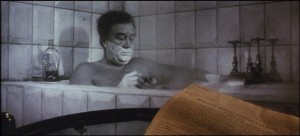 The chat.
The chat.
Adam Ok, since the movie was made in 1991, does anyone know how the color + b&w sequences were done? This was pretty much pre-CGI and before they used the technology in Pleasantville.
Rhett It seemed like blue screening to me in many parts.
Shawn I think that they were made with the same colorization techniques of the Turner versions.
Adam Yes, but I’m thinking of that shot where he was talking to her in the background, he in black and white, she in color, and she moved into the foreground in color, no longer projected, he still in black and white. He also changes colors within the shot too.
Richard Would they be able to use some post-development color adjustment to bleach (for lack of a better word) the shots with some color and some b/w?
Rhett It could be a matting of two different shots like in Dead Ringers. I’ve got a more important question. What are the color changes supposed to mean? There doesn’t seem to be a thematic connection between all the various color changes throughout the film.
Adam My feeling was that they were a mix of making us aware of the artifice and Von Trier just playing around with technology.
Shawn I thought it was indicative of the more “real” aspects of the dream.
Richard I took them to be emotional high points. That’s not always consistent, but neither are dreams.
Adam You mean, that we all dream in black and white, and the important elements were in color?
Shawn Pretty much, Adam. Like when you have a dream but you only remember bits and pieces.
Rhett Yeah, to me it just seemed like Von Trier did it because he could.
Adam After Europa, he did The Kingdom, which is less about tricks, as is Breaking the Waves. Then Dogme’ 95 came. Perhaps he just wanted to be shallow one last time. This seems to be his most gimmicky film. What he was trying to get away from when creating Dogme’ 95.
Rhett It had kind of a Dark City vibe for me, great to look at, but so what?
Richard Despite the gimmicks, I found it more effective than the other early (Europe) films. I didn’t really care for Epidemic. It’s a split film. About screen writers- but they lose their first script. Half of the stuff is with them, the other half are surreal bits from their script.
Adam In The Five Obstructions, Von Trier totally believes he is God, and can just use the other guy as a puppet. The narration in Europa seems to be used that way, to reinforce Von Trier’s Godlike status.
Shawn I thought he thought he was God here too.
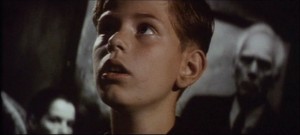 Richard The God comment raises an issue I wanted to discuss. It deals with the scene with the lovers in the room with the model train set (cut with the death of the father). Sukowa callously knocked the toy to oblivion. I got the impression from the voiceovers and general tone, that VT as director was equally callous as to the fates of the characters on the real train.
Richard The God comment raises an issue I wanted to discuss. It deals with the scene with the lovers in the room with the model train set (cut with the death of the father). Sukowa callously knocked the toy to oblivion. I got the impression from the voiceovers and general tone, that VT as director was equally callous as to the fates of the characters on the real train.
Adam The melodrama of the whole scene? How laughable and obvious the train falling off is?
Rhett There are definitely several scenes from a god-like extremely high angle throughout, when Kat hits the train off, it seems so forced.
Richard Just as unsympathetic as I would image that Von Trier feels that ‘god’ would react to any tragedy. Like ‘look at me- I control this world.’
Adam Was the drama really supposed to be genuine though? Could he really mean all of those touches? So baroque and over the top.
Shawn Yes, but that is intentional. There is nothing genuine about this movie.
Rhett Did anyone else find the shifting between English and German kind of bizarre? Like almost midway between conversations it seems, people would just start talking bad English.
Shawn I noticed scenes in English that shouldn’t have been. Like when they take the heater from the train, why were they talking in English?
Adam I think the answer to the various language question, why it shifts from German to English, is because it in the credits, where it reveals how many different countries financed the movie. They wanted to be profitable in as many markets as possible and so a modicum of English is needed to sell the movie in each territory. Shawn, did you see it at all as political commentary?
Shawn So he sacrifices his movie for profitability? I think he sees himself above that. I loved the forced irony of a pacifist in a post-war period, becoming so militant at the end.
Adam Militant? Wasn’t that just him getting upset at the wrong time? And then he sets off the bomb anyway. Out of accidental frustration.
Shawn Perhaps, but there is still the picking up of the weapon and taunting the passengers.
Adam Shouldn’t he have spoken up earlier?
Rhett He just explodes out of nowhere, but then right after he quietly suffers in sorrow. Barr’s character seemed so poorly developed.
Richard Speaking of the lead guy, at first I hated him. He seemed unbelievable and difficult to watch. As it progressed, I changed my mind. It was like he was stuck in one of those hopelessly complex noir mysteries.
Shawn A war sympathizer becoming a terrorist… It’s silly.
Adam I thought he was just an insufferable idiot, believing he could have some effect on a war torn country, simply be being not involved, having others force their will upon him.
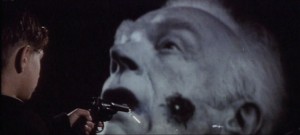 Rhett I thought Barr was awful, about as emotive as Brendan Fraser in Dudley Do-Right.
Rhett I thought Barr was awful, about as emotive as Brendan Fraser in Dudley Do-Right.
Richard Also, since the narrator speaks directly to us, I took him to be my stand in. Just as confused as I would be in such an out of control world. He was terrible, but was that intentional? Comic effect?
Rhett I am not sure if it was intentional, I haven’t seen any of VT’s other films.
Adam He was equally awful in The Big Blue. So I think he is just a poor actor.
Rhett But it seems like he just doesn’t understand Americans?
Shawn Yes, I don’t think that was intentional. He just stinks.
Adam Much like Dogville, I felt this was just a critique on America, from the outside. Our smugness exposed.
Richard I think he definitely dislikes Americans. Dogville makes that more clear. Our ineptness in situations where we have no place.
Rhett But he has never even been to America. Seems pretty shallow to me.
Shawn There is no emotional bond between the viewer and any of the characters.
Richard Here’s his justification for making the USA trilogy w/o visiting… “The cast/crew of Casablanca never visited Morocco, but they still made the film.” I could care less if he ever comes here, but it seems an absurd justification to me.
Rhett Another motivation that doesn’t really seem to have any thematic groundings. I really did not get much out of the film, there were too many distancing stylistic effects that just took me right out.
Shawn I think he used the different languages for the effect of it.
Rhett Kat’s speech at the end, devoid of any style, was the best part, and to me had the most meaning. Her monologue on Werewolves.
Richard Multiple languages as a distancing technique, Shawn? Personally, I really liked the stylish distance. It reminded me of Fassbinder and early German film.
Rhett But a distancing effect for what purpose?
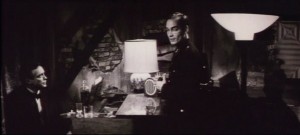 Shawn We presume that Von Trier has a God complex. This is not a movie, just scenes. If you are so high on yourself that you are going to make a film like this, why not use different languages.
Shawn We presume that Von Trier has a God complex. This is not a movie, just scenes. If you are so high on yourself that you are going to make a film like this, why not use different languages.
Adam So there’s no overall point about American ignorance and inefficiency?
Richard To be Brechtian? Because he can?
Shawn Why not? He’s God. It was a bunch of pretty scenes and unique rear projections. Any message that may have been intended is easily lost amongst the imagery.
Rhett So why should we give a shit then? Seems pretty esoteric to me.
Adam I thought the distancing stylistic choices had to do with showing us how little control we have within the movie and within the situation. Yes, it’s a God complex, but isn’t that part of what he’s arguing against? Americans and their God complex.
Shawn I can see your point about the American ignorance.
Rhett The imagery was almost counter-productive.
Adam America waits until it is too late to get involved, not understanding the culture. Trying to impose its will and belief.
Richard All flash and no understanding. Thinking that we know it all.
Rhett But the one American in the film definitely wasn’t trying to impose anything. If anything he is the opposite of what one would consider the typical American.
Adam He says early on that he wants to help. He just doesn’t know what that means. He thinks the Germans need people to be nice to them.
Shawn No, but the one American in this film says he felt the “need” to be there.
Rhett But he was there to be nice, not to make them reform.
Adam The other American in the film is using him, the Colonel.
Rhett Americans certainly didn’t wage war against Germany to be nice.
Shawn Everyone is using him. Which brings in the obvious Noir aspect.
Adam No, but we waited until too late to enter. It’s part of the point about the train, we only cared that we were attacked. He’s using this train that had previously been used to cart Jews to be gassed, he has no awareness of that. If we had arrived on the scene earlier, just as if he had, we could have made a difference.
Shawn That was a great scene, it had the wonderful Udo in it.
Rhett But what does Leopold have to do with VT’s God complex?
Richard His naive views reminded me of the early scenes of Hiroshima, Mon Amour. The French woman was there to help. She thought she saw the truth, but never really did. Why are you here imposing on us? You don’t belong. You can’t understand. Message?
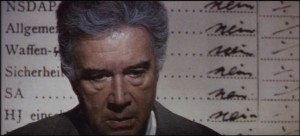 Adam Is there a sense that the melodrama is self-mocking? Not just of itself, but of all melodrama. There was one scene that struck me that way. A family argument early on when Kessler comes over for dinner, where they have such a stereotypical argument about blame. It played just like the French Plantation scene in Apocalypse Now Redux, as if they have that same discussion every night.
Adam Is there a sense that the melodrama is self-mocking? Not just of itself, but of all melodrama. There was one scene that struck me that way. A family argument early on when Kessler comes over for dinner, where they have such a stereotypical argument about blame. It played just like the French Plantation scene in Apocalypse Now Redux, as if they have that same discussion every night.
Richard That’s another Fassbinder connection. Using melodrama and convention to point out how banal convention is.
Adam Von Trier began to adapt Fassbinder’s style more and more after Europa, with the whole feeling that each scene will be more of a downer than the last, things will get worse and worse, and there’s nothing you can do about it. You’re fate’s pawn.
Shawn Von Trier must be fun at parties.
Richard Has anyone else seen Lola or Berlin Alexanderplatz? Sukowa stars in both of those. It seemed a blend of the two roles. Fate as dictated by Von Trier.
Adam Shawn, if you see The Five Obstructions, you’ll just want to hit the guy. So obnoxious and self-serving. Ego so large that he misses the point on every occasion. Though it’s a great film anyway, despite and because of Von Trier. Because he’s such a cock.
Richard Shawn and Rhett may not have noticed it (not having seen much of VT), but what do you make of casting himself as the Jew?
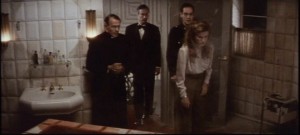 Adam I thought that was self-defeating and clever at the same time. It is the ultimate “I am God” scene. He decides the character’s fate and he sells them out because he stole some food and didn’t want to go to prison. It appeared to be the most overt statement that the drama itself was not important. The writer/director is saying that the moral compass is unimportant.
Adam I thought that was self-defeating and clever at the same time. It is the ultimate “I am God” scene. He decides the character’s fate and he sells them out because he stole some food and didn’t want to go to prison. It appeared to be the most overt statement that the drama itself was not important. The writer/director is saying that the moral compass is unimportant.
Shawn To be honest this movie was just visual porn to me. I would have had almost exactly as good a time watching it muted. Because I really loved the look. I thought the use of the projections was very pretty.
Rhett Can it be argued that the whole final act is all some sort of induced dream? Since Sydow tells Leopold to imagine a year in advance at Christmas.
Richard I thought that the whole thing was an induced dream/hypnotism. I really liked how ‘we’ didn’t wake up in the end. I half expected some cheap cut away to a sweaty man who dreamed it all up. But VT lets the characters drown. Without regard. Without remorse.
Adam I’d think the whole thing was a dream where you can’t do anything. He’s just being moved from one piece to another. It could be seen as an induced confession. Perhaps as the quote was “God doesn’t forgive those who are lukewarm,” maybe the whole thing is his plea to get into heaven. And it works like Defending Your Life. He has to defend his fears. But God keeps showing his weak moments. To prove that he isn’t worthy, since, in a dream, you aren’t supposed to die, this would be one step beyond that.
Richard That’s why I found the ending so bleak. That he was suggesting since his film was a dream that we couldn’t wake up from, God’s reality may be just as bleak.
Rhett The title shown at the end looked as if it was culled from a propaganda banner.
Adam Noe stole that title look for his films, especially I Stand Alone.
Shawn Yes, it did have that bold exaggerated look, but so did some scenes throughout the film too. With newspapers as the backdrop and all.
Adam The narration in Dogville is blunt and used ironically. Is it the same here? Do we read Von Sydow as God? Or is it a further joke? Since he was in The Seventh Seal and had to deal with death.
Shawn If you are willing to accept that Anti-Americanism, I could agree with that.
Richard I took it as another joke.
Rhett And there are characters in this film playing chess.
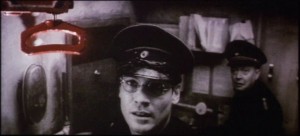 Shawn Going back to what I said earlier about the film being intended for an American audience. It forces you into the role of an American (or America), who isn’t particularly wanted in Germany, and ends up coming with best intentions and causing harm instead.
Shawn Going back to what I said earlier about the film being intended for an American audience. It forces you into the role of an American (or America), who isn’t particularly wanted in Germany, and ends up coming with best intentions and causing harm instead.
Adam Yes, just like we always do in terms of war and policing other countries.
Shawn To top with the character being a moron, I could see some political commentary there.
Richard Doesn’t that make it anti-American? I think that most audiences would take offense.
Rhett Fucking Americans.
Richard I, personally think it is an accurate portrait… But I’m not exactly patriotic.
Shawn Yes, but I think that is the kind of reaction that he would want.
Adam I don’t think he was worrying about American audiences, just as many different countries as he could. Which, being in English, helps him, marketwise.
Rhett But in this film the American is a pawn, whereas in reality American’s are usually the ones that do the leading.
Adam Well there’s a hidden message. Kessler is continuously congratulated for not doing anything. “That was the best you could do.”
Rhett And I am not sure we can interpret the American as a blanket representation of all American’s at war, since in a way he is going against the American way.
Shawn I noticed that. He even comments several times saying “but I didn’t do anything.”
Rhett Since he is AWOL and there to help.
Adam But he is AWOL from a war he is trying to salvage. It is a furiously ignorant position, very short-sighted. Much like Americans.
Rhett So in that sense he isn’t American, he is escaping from that.
Shawn He also gets told he doesn’t understand how things work in Germany. Particularly in the shoe-polishing scene.
Adam The thing that Von Trier takes from one film to another is this feeling of incapacity. All these horrible things happening to you, no matter your intentions, no matter if you are a good person, no way out.
Shawn That is really forced in this film, since the narrator tells you who you are, where you go, and what you will do.
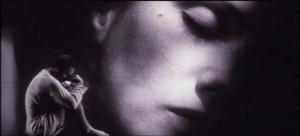 Adam What’s the point of making the viewer feel like that?
Adam What’s the point of making the viewer feel like that?
Richard Did anyone else read the congratulatory scenes and the endless repetition were commentary on bureaucracy/red tape in general? I found it all darkly comical. Almost like a WWII version of Brazil.
Adam I get that from Polanski and Fassbinder a lot.
Richard It seems to me that they do it because they can and that they see it as the opposite of melodramatic manipulation.
Adam Is it simply a European sensibility? Because, feel-bad filmmakers like Schrader and Friedkin, they don’t really have that oppressive feel, just very matter of fact shittiness. But isn’t it exactly melodramatic manipulation? Something like Dancer in the Dark, which is all downers in the second half, one inexplicable act of cruelty after another. To have us empathize with a character only to punish them, that is pretty manipulative.
Richard It’s definitely manipulative. I just don’t get the same feeling as a typical melodrama. Dancer in the Dark would be melodrama because I care about Selma. Here, it’s forceful without the real emotional connections. I’m not sure how to draw the line or define it.
Adam What is the difference between the European and American versions of feel-bad films?
Shawn It is manipulative, but other films like those of Polanski’s still have more “entertainment” to them. This film lacks it, it almost goes out of its way to depress you by not even giving you a character to identify with or like.
Adam Polanski doesn’t always give you someone to empathize with. The Tenant and Bitter Moon are full of nothing people.
Rhett Perhaps it is VT’s way of showing how war dehumanizes us to the point of emotional detachment. Adam, I cared about Polanski’s character in The Tenant.
Shawn True, but The Tenant and Bitter Moon had characters that had interesting quirks. Something that separated them from each other. So you could at least see them as people.
Rhett The Tenant was also much more personal, always from the perspective of Polanski. Europa takes such a detached viewpoint, it is really impossible to give a shit about anybody.
Adam But is that a problem? Would you rather be detached from someone or watch them suffer?
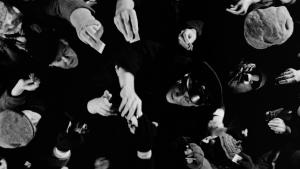 Richard I don’t think it is a problem. It could be another commentary on America.
Richard I don’t think it is a problem. It could be another commentary on America.
Shawn Well it’s important for the sake of making a film with the audience in consideration.
Adam I’m not sure this was made with a wide audience in mind.
Richard We want to help, but when we get into the thick of it, we are such outsiders that we are unable to connect or care.
Rhett And Sydow does refer to the audience directly as “you”, so it isn’t as if VT didn’t try to get the audience involved. He just failed.
Shawn You say that it wasn’t intended for a wide audience, but you also say that it was made to cater to many markets. I find that somewhat contrary.
Adam I’m not sure the “you” refers to us, more so Barr, because we see the image of Barr when he says that as they skip forward a year.
Rhett Well, we are a surrogate Barr.
Adam The language thing was a concession made to the producers. That is obvious. The same is true of The Element of Crime, which is in English, even though it shouldn’t have been.
Richard Speaking of Barr- Would Rhett and Shawn care more about it if he were a better actor? Or is the detachment entirely due to style and the lack of interest in the drama?
Shawn I don’t think a better actor could have made me care more because I was too distracted by the imagery.
Rhett The acting was very distracting…it wasn’t even that he was detached, it was just that his readings were so amateur.
Adam I think the lost and aimless look on his face were appropriate. It was like Verhoeven directing the actors to be serious in Starship Troopers. Don’t alert them of their weaknesses. Just manipulate what you want out of them. If Barr knew that the movie was in essence not about him, the drama was secondary, it would have the same effect if Verhoeven told the 90210 actors that Starship Troopers was satire.
Rhett Not that any other actor could have done that much better of a job at some of VT’s dialogue.
Shawn I would have felt more connected if the film wasn’t narrated as a whole. If they stuck it just to beginning and end I would have felt more involved. I don’t need to be told I am making love, when I see “myself” (Kessler) making love. I get it.
Richard Shawn- was it that the narration was too descriptive of what was taking place on screen or were you dissatisfied with the entire hypnotism/dream idea?
Rhett The dream idea was one of the things I liked best about the film.
Shawn I loved the fact that it was dreamlike and hypnotic. But I understood that within the first minute of narration. The beginning and end were beautiful; it didn’t need any more narration then in those scenes.
Rhett Since nightmares have the characteristic of being uncontrollable which seems to fit VT’s pre-occupation of non-stop suffering.
Adam Perhaps if he left the narration only at the beginning and end, it would have seemed like patchwork to cover up the surrealism of it. It’s more intertwined within the film if it’s all throughout.
Richard I agree Adam; I thought it kept things consistent.
Shawn I think that it was a weak transition tool. I already knew I was dreaming. A quick cut to a later time would have been more gratifying to me.
Adam That would give you the idea that Barr had some sense of control. We are often reminded that he doesn’t and this only reinforces it.
Richard How did you feel about him not waking up at the end? Dying in the dream?
Rhett I liked the narration throughout, but what Sydow was saying always had more impact than anything that was happening on screen. The story was never really involving or shocking.
Shawn I felt we were reminded too often. I loved the dying in the dream bit. Especially after what Adam reminded me of above. That we are not supposed to die in dreams. But I still liked more it for its visual aspect then for the story.
Adam Apart from when the kids start killing people, the close-up when the mayor gets shot was rather striking as it was projected on a huge scale with the bullet hole going through his cheek.
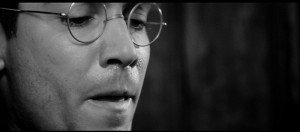 Rhett See, that didn’t shock me at all, because I was too busy questioning why the hell VT felt the need to suddenly change to color, like the moment something gets interesting he deliberately fools with the image to take the viewer out making sure they are always at a distance.
Rhett See, that didn’t shock me at all, because I was too busy questioning why the hell VT felt the need to suddenly change to color, like the moment something gets interesting he deliberately fools with the image to take the viewer out making sure they are always at a distance.
Richard Do you think that the color was appropriate to any scene?
Rhett Well, I thought the scene with daddy cutting himself and all the red blood was actually pretty powerful. But otherwise it was a distraction to me like, why have the characters change colors in mid-conversation? It just seemed to happen way too often to hold any significance It works much better when the effect is reduced to a single form of imagery, like the red coat in Schindler’s List.
Adam I first saw the movie in the theater and was drawn in by the style and technique, thought the story was secondary, but interesting enough as an idea. The second time it was more of a focus on the commentary, what was he trying to do, what was the purpose. I found the style rather a distraction, but a purposeful one. My memory of it was only the visual and a faint outline of the story, so I don’t think there was any influence from the first time.
Shawn Much in the same way as most of Natural Born Killers (which also used a lot of projections), the first time, all I saw was the direction.
Richard I liked that the style was a distraction. For the most part, I don’t want to care about the characters in films. It takes a lot for me to connect with them. The fact that a director would intentionally do everything in his power…. Use every trick in the book to keep me from caring was a plus as far as I’m concerned.
Adam Why don’t you want to empathize? And why do you find it so difficult?
Richard I hate to get emotionally involved in almost anything, but that’s more my personality in general than an approach to film. I think it’s a defense mechanism. I like to have to keep my wall up. I couldn’t deal with it otherwise. I also like to save my empathy for people/characters that really deserve it. When they are shallow (such as here), I don’t want to waste any empathy.
Adam Well that will help in being a lawyer.
Rhett If the director doesn’t want to involve you in anything that is happening on screen, then what is the point? Why even make movies for an audience when it is clear he just wants to make movies for himself?
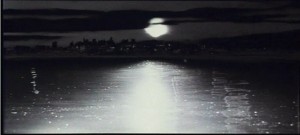 Adam In his newer films, he’s just into punishing the audience and pretending there is a lesson of morals behind it. Did no one else feel the absolute fear permeating throughout the film? As if Barr’s character was afraid of being afraid. And it was an endless circular feeling. The frustration of not being able to change a thing.
Adam In his newer films, he’s just into punishing the audience and pretending there is a lesson of morals behind it. Did no one else feel the absolute fear permeating throughout the film? As if Barr’s character was afraid of being afraid. And it was an endless circular feeling. The frustration of not being able to change a thing.
Shawn I felt forced fear from the narrator. Just the booming tone of his voice told me I was supposed to feel fear.
Richard I noticed that. It wasn’t as tense as something like Punch Drunk Love, but there was a consistent awkward air to it.
Adam It’s as if we would be screaming at him to do something and we are screaming in a padded wall.
Shawn “You will be scared now, because you can’t possibly associate with these characters, I will tell you how you feel.”
Adam “My lunch is cold. You will reheat this in the microwave. You will then buy me a soda.”
Richard Do you think that Barr fits that Hitchcock quote about actors being cattle? Only good for their look- moving them like set pieces?
Rhett Actors as cattle in a holocaust era film? Isn’t that a bit of a mixed metaphor?
Adam He is in a number of Von Trier films, so perhaps he knew what he was doing. I think he is perfect at being cattle though. He should have been in a Bresson film.
Shawn He is definitely a pawn. But I would want to see another of his films before I judge him as an actor. He might have been intentionally directed to act as he did.
Richard Just like the priest or convict in Diary or A Man Escaped. Bresson seems kinder to his female leads- or at least gives them some emotion. But, they are all ultimately ruined. So, maybe he is just as detached as Von Trier. I was never able to come up with a solid example of the difference between Euro and American feelbad or melodrama, but maybe that’s it. Dashed expectations.



